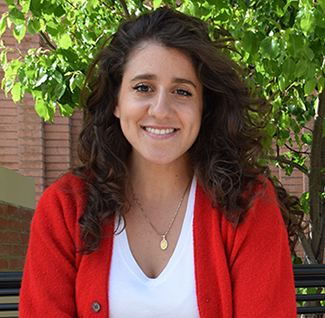
Stefanie Kundakjian
In his testimony for the Armenian Film Foundation, recorded in 2012, Armenian Genocide survivor Sebooh Gertmenian describes how he survived the genocide as a three year old with the help of his mother.
The interviewer marvels at his mother’s strength, how she was able to keep her children alive on a forced march through the desert after her husband and older child had been murdered. Gertmenian, perhaps having never thought of his mother in this way before, says with wonder, “She must have been an angel.”
Gertmenian’s testimony is especially significant for Stefanie Kundakjian, a graduate student at the American University in Paris who is watching testimony in the Visual History Archive as research for her master’s thesis. Kundakjian has spent the past three weeks at USC Shoah Foundation Center for Advanced Genocide Research as part of a fellowship from the George and Irina Schaeffer Center for the Study of Genocide, Human Rights and Conflict Prevention at AUP.
Kundakjian is studying international affairs, conflict resolution and civil society development. Her master’s thesis will focus on the role of women in the Armenian Genocide, and how this is linked to the current situation of women in Armenia.
She has been watching testimonies from USC Shoah Foundation’s Armenian Genocide collection, which were recorded by the late J. Michael Hagopian and originally preserved by the Armenian Film Foundation, looking for both men’s and women’s memories of how women dealt with the genocide, trauma, and the aftermath.
“Not only was there a specific gender experience [women] went through, but in reconstituting the nation they played a particular role,” Kundakjian said.
She’s also planning to see how the past might connect to the recent phenomenon of Syrian Armenians referring to their country’s current crisis as a “genocide.”
“In looking at the past I’m hoping to show the role [the genocide] has had but without letting it define the Armenian people,” Kundakjian said. “By looking at the trauma through women’s experience I hope to bring to light some of the historical cores of the way gender norms, gender stereotypes and traditions and expectations of women today have been created and the legacy of those roles.”
Kudakjian herself was born in Southern California but grew up as part of the Armenian diaspora in Uruguay. She grew up hearing stories about the genocide from her grandparents, and said watching testimony gives viewers an idea of what it’s really like to be in a room with a survivor as they share their story.
“You get to really feel some degree of the experience that the individuals had,” she said. “That’s remarkable.”